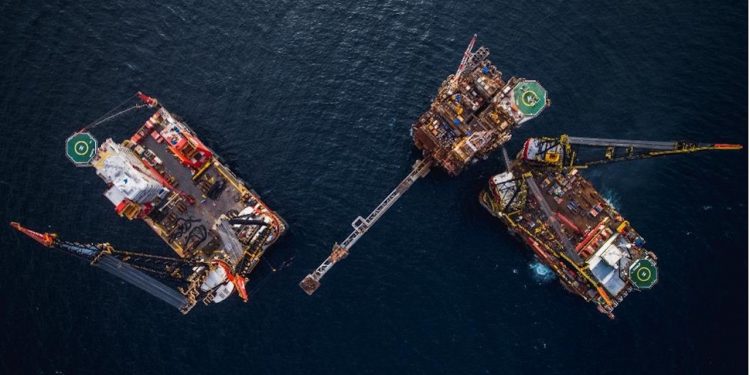The UK offshore sector aims to spend £16.60 billion on recovering more than a million tonnes of disused oil and gas structures from the North Sea over the coming decade.
Disused oil and gas installations ranging from massive rigs to the well heads in hundreds of metres of water are to be brought to shore for reuse, recycling and disposal in the coming decade, according to an industry report.

OGUK, representing the offshore oil and gas industry, is setting out plans for what is touted as one of the largest marine removal programmes ever attempted.
Companies directly involved in extracting oil and gas will spend an estimated £16.6 billion pounds on the programme, supporting thousands of jobs both directly and in the supply chain.
Roughly 95% of the material from such installations is typically already recycled but the focus is now moving towards reuse – where component parts, or occasionally whole structures, are redeployed for new purposes with minimal modifications. This avoids the energy and associated emissions needed for cutting up, smelting or crushing components, or making new ones.
The industry has already shown its resilience – with work continuing safely all through the 2020/21 pandemic. The oil and gas industry continued through the pandemic, decommissioning 234 wells, removing 21 platforms plus more than 50,000 tonnes of other underwater structures.
Examples include the Brae Bravo Platform, operated by the Abu Dhabi National Energy Company (Taqa). This 36,000-tonne structure was sent to Norway, where 95% of its material was destined for recycling or reuse.

‘Decommissioning is more than a great challenge. It’s also a huge opportunity for UK companies to show their engineering skills, powers of innovation and ability to compete on a global scale,’ said Joe Leask, OGUK’s decommissioning manager.
‘OGUK’s 2021 Decommissioning Insight report shows that over the last five years the UK decommissioning industry has improved its efficiency and cut its costs by an estimated 23%. So, we have done better but I think we can still do a lot more. If operators work together to create larger projects where we get economies of scale, then we can safely drive costs down even more,’ he said.
‘Decommissioning is also a key part of the UK’s transition to low-carbon energy and its aim of reaching net zero by 2050. This is partly because the installations being removed tend to be older and so generate more emissions relative to the oil and gas they produce. It is also because of the growing opportunities for reuse, repurposing and recycling. Reuse is when infrastructure or equipment is taken away and used again elsewhere. This is already becoming common with forgings, pipeline valves, turbines and electrical kit. This is going to be an exciting ten years – there’s a huge amount of work to be done and with £16.6 billion to be spent, there will be many opportunities for UK companies and workers.’









